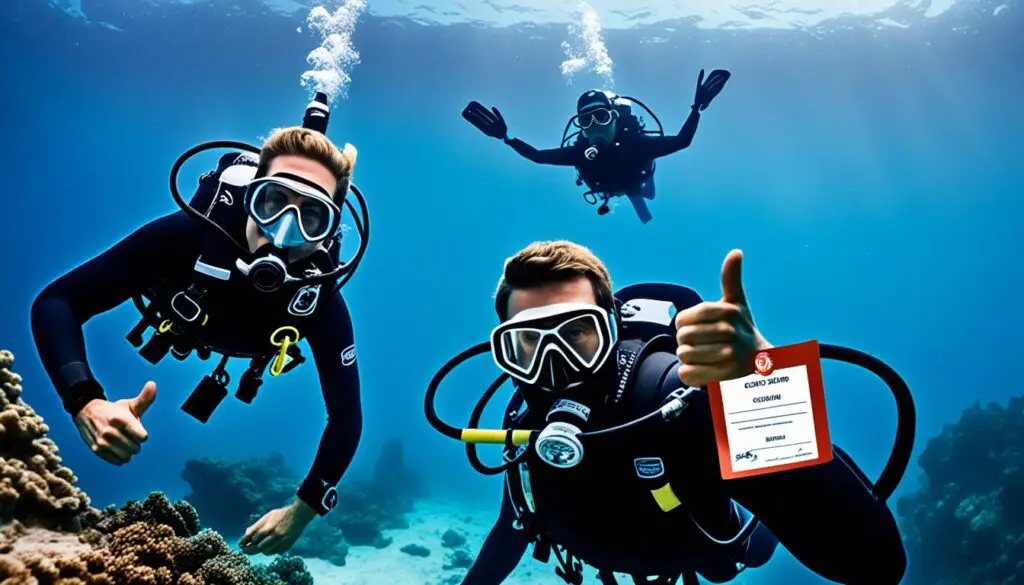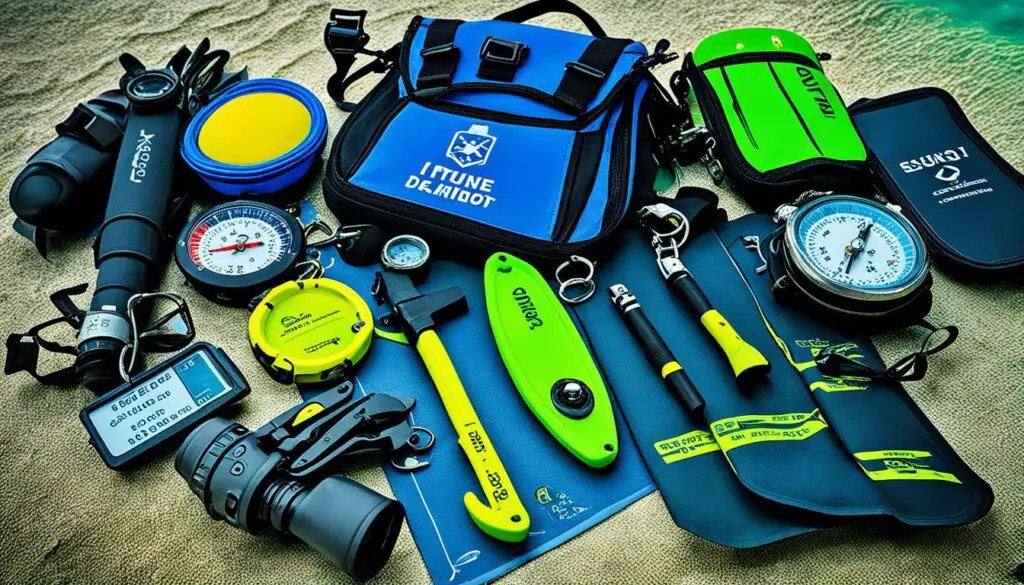Scuba diving and freediving are exciting ways to see the sea’s wonders. But, remember, safety comes first. This article will explain 10 critical safety tips for both scuba diving and freediving. These rules will help divers stay safe, have fun, and enjoy the underwater world.
Key Takeaways:
- Diving features are crucial for maintaining safety during underwater exploration.
- By following the rules outlined, divers can minimize risks and enhance their underwater experience.
- Certification, buddy diving, and proper planning are essential for safe diving.
- Regular equipment checks, monitoring air supply, and maintaining buoyancy control are key safety measures.
- Understanding and implementing these essential diving features will ensure a safe and enjoyable underwater adventure.
Get Certified and Never Dive Alone
Diving is amazing, whether it’s scuba or freediving. Getting certification is crucial. It means getting trained by a trusted source. This training will give you the skills you need for safe and thrilling dives.
Diving is safest with a buddy by your side. Your buddy keeps you safe, shares gear, and looks out for you. Always remember: you should follow the one up one down rule in freediving. This means going with a buddy or having a safety diver to watch over you. They’re there to keep you safe and help if something goes wrong.

Plan Your Dive and Conduct Pre-Dive Checks
Planning and checking your gear is key before you dive. Make a detailed plan. Think about the depth, how long you’ll be down there, where you’ll get in and out, the ocean’s condition, and any dangers. A solid dive plan means you know what you’re aiming for and can swim without worry.
Before diving, always check your equipment. Look at your air, dive computer, BCD, regulator, and all the gear. They should work perfectly. This way, you can fix anything wrong before it’s a problem in the water.
For freedivers, specific gear checks are crucial. Make sure your buoy on the surface and ropes are good. They help others see you and stay safe. Also, ensure your mask won’t fog and that your weights are set up right for diving.
Why Dive Planning and Equipment Checks Matter
It’s vital to plan your dive and check your gear for safety. This ensures a better dive with fewer risks. Remember: safety first always.” – David Thompson, PADI Master Scuba Diver Trainer
Adding dive plans and gear checks to your routine keeps you safe. It also makes your dives more fun and less stressful. So, prepare well and check everything. Safety is top priority.

Pre-Dive Checklist
- Create a detailed dive plan, considering factors such as depth, duration, entry/exit points, sea conditions, and potential hazards.
- Check your air supply and ensure it’s within safe limits.
- Inspect your dive computer and verify that it’s functioning properly.
- Test your BCD to ensure it inflates and deflates correctly.
- Inspect your regulator for any damage or signs of wear.
- Check your mask for a proper fit and ensure it has been defogged.
- Verify that your weight system is set up correctly for buoyancy control.
- Ensure your surface buoy and ropes are in good condition for freediving.
Monitor Air Supply and Maintain Buoyancy Control
Keeping a close eye on the air you have left is key when you dive. Always look at your gauge to make sure you’ve got enough air. This helps you finish your dive safely and without worry.
Being able to control your buoyancy is very important. It keeps you floating just right in the water. Avoiding sudden up or down movements is crucial for safety.
Having the correct amount of weight is very important, whether you’re scuba or freediving. Check your weight before each dive, especially if your gear changes. This step is crucial for staying safe underwater.
FAQ
How important is it to get certified before diving?
Certification from a reputable diving agency is key to diving safely. It teaches divers essential skills and knowledge. This forms a strong base for your dives.
Why is diving with a buddy recommended?
Diving with a buddy is safer. It allows for quick assistance and equipment sharing. Your buddy becomes an extra set of eyes in the water.
What is the one up one down rule in freediving?
In freediving, the rule is simple: have a buddy with you. This ensures mutual safety. Each diver looks after the other, ready to help if needed.
How important is dive planning and pre-dive checks?
Planning a dive is crucial. It involves knowing the dive spot, depth, sea conditions, and hazards. Checking your gear before diving helps avoid problems underwater.
What should be checked during pre-dive equipment checks?
Before diving, check your air tank and dive gadgets. Make sure everything works right to prevent issues. Freedivers also need to inspect their gear and systems properly.
Why is monitoring air supply important during dives?
Keeping an eye on your air is vital. It’s key to a safe return above water. Always make sure you have enough air to ascend properly.
Why is buoyancy control essential during dives?
Good buoyancy control prevents sudden movements up or down. Using your fins and gear correctly keeps you at the right depth. This makes your dive safer and more enjoyable.
How should weight be managed for scuba diving and freediving?
Getting the right weight is crucial for both scuba and freedivers. Always check your weights before each dive. This ensures you move in the water easily and safely.
